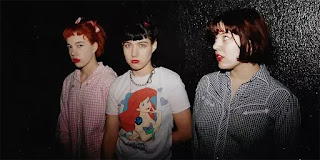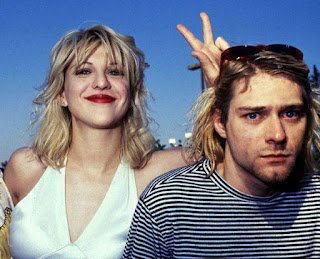Sara Marcus: Three days before the appointed Sunday in April 1994, Kurt Cobain’s body was discovered in a greenhouse in Seattle. I remembered that Newsweek had referred to Courtney Love, now Cobain’s widow, as the riot grrrls’ “patron saint,” but I’d never cared about Nirvana or about Love’s band, Hole. Fearing that a grief-filled meeting would separate me from the other girls right off the bat, I nearly stayed home. Still, I went, and when I finally stepped over the threshold of Positive Force House into its first-floor living room, I found that nobody else at the meeting cared about Nirvana or Hole either. We talked about sexual harassment from classmates and teachers, crushes on boys and girls, our favorite kinds of tampons and ice cream, and our outrage over the sexist stories and images we saw in the newspapers and on television. These girls weren’t all punk, they didn’t all have bands, and while they were the coolest girls I’d ever met, they were cool in a way that drew me closer instead of shutting me out. They were courageous, profane, and powerful. I was going to be one of them. A friend of a friend at school gave me a Bikini Kill tape—I knew that the band was somehow linked to Riot Grrrl—and for a while no other music mattered, just that breastbone-shaking bass line and Kathleen Hanna’s voice singing with all the concentrated fury of a firehose, “Dare you to do what you want! Dare you to be who you will!”
Jessica Hopper FedExed a reporter a big package of zines, Hit It or Quit It as well as others. And she went on record in an hour-long phone interview. On the day the November 23, 1992, issue of Newsweek hit the streets, a regular Wednesday night Riot Grrrl meeting took place at the Emma Center. Jessica arrived late; she had stopped off at a newsstand to buy the magazine. The other girls had already picked up a copy of the issue—and although Jessica had warned them of an article—they were aghast at what they saw. “Revolution, Girl Style” occupied a two-page spread in the Lifestyle section, complete with a photograph of Jessica (the caption dubbed her a “prototypical Riot Grrrl”), a portrait Alice Wheeler had taken of Angie Hart and a photo of Courtney Love, whom Jessica had described as “Riot Grrrl’s patron saint.”
That designation stemmed only from the fact that Love had passed out copies of Hit It or Quit It at Hole shows in England. Love actually had an odd antipathy for Riot Grrrl and especially for anybody associated with it who had been close with Cobain before she had met him, namely Kathleen Hanna and Tobi Vail. Love had recently left a long, rambling answering-machine message for a girl named Nina Cunzio, who was trying to get a Riot Grrrl group started in LA: “We should totally have meetings at my house, I’d love that a lot,” Love had said, sounding to Nina like somebody on drugs. “But you gotta lose this Kathleen Hanna bullshit.” Nina never called back. In just a few months, Love would write a vicious column in Melody Maker, blasting Bikini Kill. How could Jessica Hopper have done such a thing—spoken for the entire movement, to a national magazine, without even consulting with the rest of them? It felt like a gargantuan betrayal of trust, like Jessica had just been using all of them to gain more exposure for her own projects, no matter who else got hurt along the way.
Another malignant rumors about Kathleen spread by Courtney Love: One thing that immediately comes to mind about what Kathleen Hanna's MO is when Mike Watt (from the Minutemen) asked her to be a guest on his first solo album and she wanted to prove a point that she didn't want to be in the company of bros so her contribution was to leave a message on Watt's answering machine with a fake story about how someone who was on the album had raped a girl. Really distasteful stuff. She called it her anti-contribution. To honor this offer, Watt put it on the album. She's just someone who seems to rotate around her own gravity. She's straight up falsely accusing someone of raping a 13 year old girl and calling it art. That's very distasteful at any level. Also she laughs it off as it just being during one of her lying phases, which is ridiculous.
Did you see her interview with V magazine? She admitted as a child she would steal her dad's credit card and buy silk blouses. She sounds like a scammer and then she married to a guy who'd bragged about “fag-bashing.” Source: www.hootpage.com
But, unlike Courtney Love, Bikini Kill were always surrounded by controversy just because they were an outwardly and aggressively feminist band. They were very much needed in the 1990s punk scene and respected by all from that scene and Adam Horovitz changed his views considerably since his days in the Beastie Boys. Bikini Kill were one of the best bands of the grunge era, and way more important politically than Hole. Aside from their aesthetic and political differences, I think the motivation of Love to punch Hanna at Lollapalooza festival was mainly jealousy of Hanna's close relationship with Kurt Cobain. Although Cobain ended up dating Tobi Vail, it's between the lines that his main attraction was towards Kathleen, but she allegedly only agreed to a friendship because she was scared of Cobain's substance abuse and wary of his obsessive claim to fame.
Kathleen Hanna: Bikini Kill and The Nation of Ulysses (I was dating Tim Green at that time) all drove back back to Olympia in late August to play K Records’ one-time-only convention, called the International Pop Underground (IPU). “Defeat the Corporate Ogre” was their slogan, and the repetitive mentions of being “anti–corporate rock” seemed pointed at Nirvana, since they’d just signed to a major label (Geffen) and had left Olympia. It felt like a line was being drawn in the sand: Nirvana was no longer welcome in K’s indie purist clubhouse. Kurt had been nothing but supportive of the Olympia scene (he even got a K Records tattoo) and it felt gross that they were publicly slamming him that way. Was it really so bad that a working-class guy who couldn’t afford to play five-dollar shows for the rest of his life had signed to a major label? Was it really so bad that his band wanted to reach an audience that didn’t have access to labels like K or Dischord? The indie vs major labels thing started to seem like a silly hill to die on to me.
Sara Marcus: Ian MacKaye had introduced Jett to Bikini Kill, and she was instantly impressed by both the music and the zines. She was particularly heartened that a rock ‘n’ roll feminism was catching on; she could have used some of that in the late ‘70s, when she was a teenage guitarist playing in the Runaways. “The Runaways had nobody,” she said. “I felt like a feminist, but I felt completely dissed by other feminists, ‘cause they were like, ‘Well, you can’t dress sexy.’ Number one, I’m not dressing sexy—even though I did have my pants open from time to time. But what do you mean? You don’t tell me that girls don’t get horny and don’t wanna fuck! You know why they say that girls ‘can’t play guitar’ and ‘can’t play rock ‘n’ roll’? Because rock ‘n’ roll is sex. So meeting people like Kathleen and all those girls, it was really incredible, because I felt like maybe people were starting to get it.”
Bikini Kill had recorded a full-length album that past October, titled Pussy Whipped, but it wasn’t due out till the following fall, and they had already written new songs to record with Jett—glammy, triumphal anthems that explored pleasure and play. And for the introduction to “Demirep,” Kathleen and Jett sat cross-legged on the floor, facing each other, and played a hand-clapping game they’d both learned when they were little girls: “Miss Mary Mack, Mack, all dressed in black, black.“ These two songs, along with a new version of “Rebel Girl,” would be released on a 7” in September 1993, a month before Pussy Whipped. Five nights later, the band played a sold-out Rock for Choice benefit to an audience of four thousand at the Hollywood Palladium. Stone Temple Pilots, King Missile, and Kim Gordon’s project Free Kitten were also on the bill, but the biggest buzz was around Bikini Kill.
Kathleen performed in a dress with the words KILL ME printed on her chest, and some men shouted boos at the band. The Los Angeles Times ran a review noting that “while much of the audience seemed unsure of just what to make of this Olympia band, there was a contingent of female fans that seemed wholly enthralled—as if they had found that music really mattered.” Working with Joan Jett had been Kathleen’s first major-label experience, but now the big guys were starting to come calling for Bikini Kill. “Kathleen had a hot band,” Jett’s manager, Kenny Laguna, recounted. “Every label in the business wanted them! Warner Brothers, Capitol, Interscope: everyone.” Kathleen Hanna: Tobi had no interest in the meetings or going to LA, so Kathi, Bill and me met with Lenny Waronker at Capitol Records, Jimmy Iovine at Interscope, and Mo Ostin at Warner Bros. To show us how edgy Interscope was, Jimmy Iovine showed us a Marilyn Manson video that hadn’t come out yet. “You guys could do an edgy video like that!” he said. “Could I hang you from a meat hook?” I asked. Iovine pretended he hadn’t heard me and continued his spiel about how great his label was. Soon after, Jimmy Iovine signed No Doubt. Gwen Stefani celebrated on the cover of Spin with the headline “Riot Girlie.”
At the time, probably influenced by his abrasive wife Courtney Love, Kurt Cobain hinted to various press outlets that he didn't understand why "those riot grrrl groups took themselves so seriously." Kathleen didn’t think Bikini Kill should abandon Kill Rock Stars, but she was curious about getting wider distribution for her music and ideas. Plus, she explained later, “I wanted to say to myself, ‘I looked into it and it wasn’t the right thing,’ as opposed to just assuming things.” Tobi didn’t even want to look into it, though; she saw what Nirvana’s success had done to them. “I was very saddened to see that that success did not make them happy,” she said. “I knew that things were really really bad: Kurt was on drugs and the band was falling apart.” —Girls to the Front: The True Story of the Riot Grrrl Revolution (2010) by Sara Marcus
















































